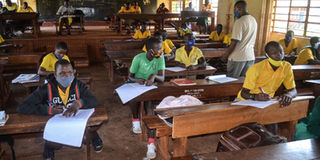Do not forget to support teachers

What you need to know:
The issue:
Teachers
Our view:
Reopening is only a start of the return to normalcy and teachers should be central to everything we want to do with the education sector.
It is D-Day. Millions of children in Uganda return to school today.
For a significant portion of the past two years, schools have remained closed as government adopted some of the most stringent measures to curb the spread of coronavirus.
The Health Minister, Dr Jane Ruth Aceng, announced last week that we are now in the third wave of a pandemic that has no end in sight. We are all learning to live with Covid-19. As schools reopen today, everyone is hoping for the best.
Now, the debate around school reopening has taken so many facets critical among which are school fees, testing and general health of the children.
The ministry has warned against increasing school fees as school owners grapple with loans. It has also stopped Covid-19 testing as a requirement before reporting.
We seem to know how to navigate all these or at least having a healthy debate about it. The one area we are not paying much attention to is the teachers.
Over the past two years, teachers have been the hardest hit. Many have opted to find alternative sources of income to support their families.
Some of these sources have proved to be more profitable than teaching. If you want to debate their choices, refer to one of the most famous phrases from 30 years ago.
“It’s the economy, stupid” was a phrase coined by James Carville in 1992, when he was advising Bill Clinton in his successful run for the White House.
In 1992, the US was experiencing an economic recession and the incumbent president, George H. W. Bush, was perceived as out of touch with the needs of ordinary Americans.
Carville told staffers to hammer on the importance of the economy– he even went so far as to hang a sign in campaign headquarters reading, in part, “the economy, stupid.”
A non-government organisation (NGO) has partnered with the government to support teachers in private schools with Shs100,000 for each teacher ahead of school reopening.
While this scheme is welcome and urgent, it is not the only need teachers have. There are likely to be staffing gaps as some teachers will not return to their duty stations.
Many may also be mentally broken and need psyco-socio support to get them into classroom routines again.
Reopening is only a start of the return to normalcy and teachers should be central to everything we want to do with the education sector.


